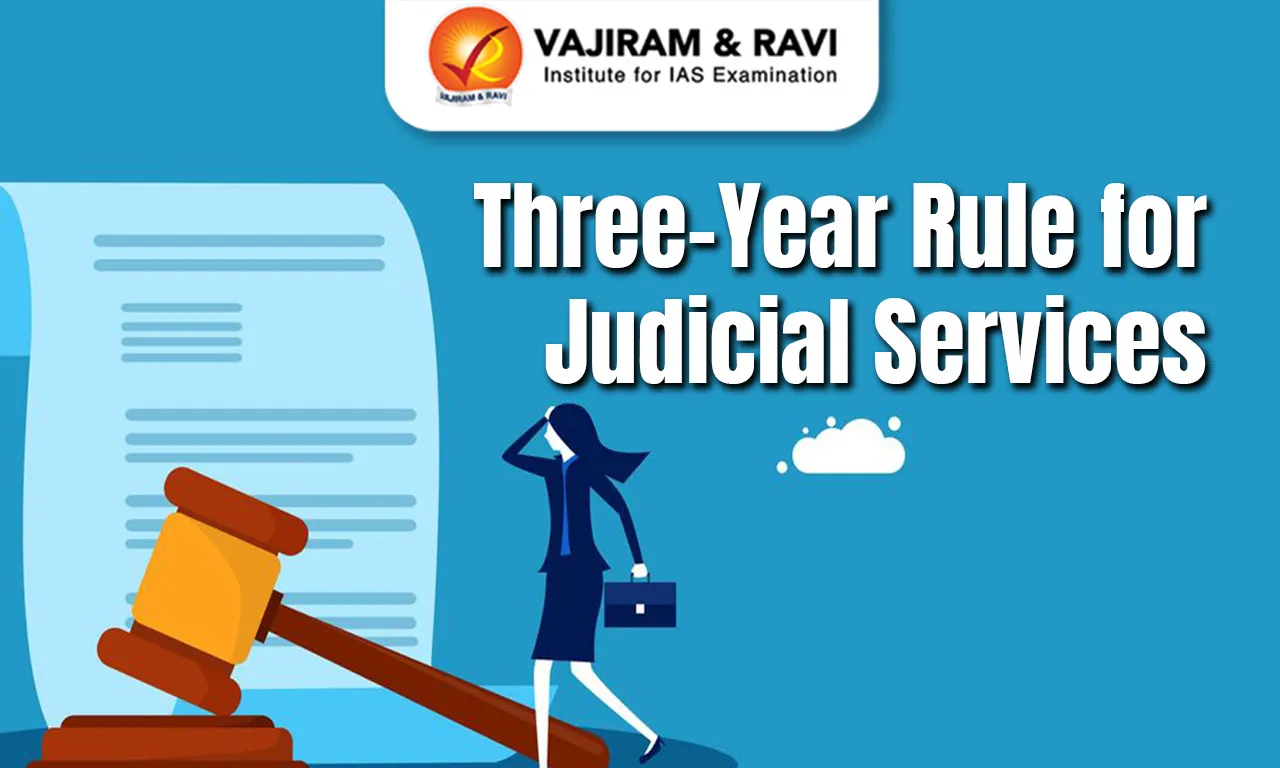Judicial Services Latest News
- The Supreme Court has reinstated the three-year minimum practice requirement for law graduates to apply for positions in the judicial services.
Introduction
- In a significant shift in judicial recruitment policy, the Supreme Court of India has reinstated the requirement of three years of minimum legal practice for aspirants seeking entry into the subordinate judiciary.
- The May 20, 2025 verdict, delivered by a bench led by Chief Justice B.R. Gavai, aims to enhance the efficiency and competence of judicial officers through practical legal exposure before assuming judicial responsibilities.
Background and History of the Rule
- The idea of requiring prior legal practice for judicial services dates back to the 14th Law Commission Report (1958), which proposed 3-5 years of courtroom experience for civil judge aspirants.
- However, in 2002, this rule was scrapped following the recommendations of the Justice Shetty Commission.
- The rationale was that the best talent was not joining the judiciary, as fresh graduates preferred more lucrative private sector roles after gaining experience.
- The court had then endorsed that a robust training mechanism could make up for the lack of courtroom experience.
Supreme Court’s Rationale for Reinstating the Rule
- In its latest verdict, the Supreme Court emphasized that neither academic knowledge nor pre-service training could be a substitute for first-hand exposure to the court system.
- The judgment stated that young judges, from their first day in office, handle issues of life, liberty, and property, matters requiring maturity and an understanding of courtroom dynamics.
- The court said that past recruitment of fresh graduates had “not been a successful experience,” and many High Courts also supported reinstating the rule.
- Key directives included:
- A three-year minimum practice to be certified by a senior advocate (10+ years).
- Law clerk experience will also be considered valid.
- Mandatory one-yeartraining before posting.
Criticisms and Concerns Raised
- Despite the court’s emphasis on experiential learning, critics argue that the move could restrict access to judicial careers, especially for students from economically disadvantaged backgrounds and women.
- Key Concerns:
- Economic Barrier: Junior lawyers in India are often underpaid. With stipends ranging from Rs. 15,000 to Rs. 20,000/month, many law graduates, especially from rural or marginalised communities, may not be able to afford three years of low-income work.
- Gender Impact: The India Justice Report 2022 noted that women comprise 38% of district judiciary judges. The new rule could deter female aspirants, especially those taking career breaks due to maternity.
- Lack of Exam Regularity: Judicial exams are not held at regular intervals in many states. Even after fulfilling the practice requirement, aspirants may have to wait years for the next vacancy notification.
- Deterrent to Top Talent: Students from premier law schools often pursue corporate law due to better pay and career prospects. A lengthy, uncertain pathway may further dissuade top performers from considering judicial careers.
A Case for Reform Instead of Restriction
- Legal scholars argue that a more effective solution would be to strengthen judicial training rather than bar fresh graduates. Proposals include:
- Extended Training Period: Enhancing pre-service training to two years, involving mentorship under senior judges and courtroom simulation.
- Exam Reform: Moving away from rote memorization toward scenario-based questions and judgment writing.
- Staggered Entry Pathways: Introducing a dual-track system, one for experienced advocates and another for young graduates with intensive training components.
The Way Forward
- While the SC’s decision is rooted in the intent to raise the quality of judicial service, it raises serious questions about inclusivity and talent retention.
- A better approach may involve a balance, preserving the court’s need for experience while creating training-heavy entry routes for exceptional fresh graduates.
- India’s judicial recruitment system, in its current form, must be reformed to attract and prepare the best talent rather than filter them out.
Judicial Services FAQs
Q1. What change has the Supreme Court made to judicial service eligibility?
Ans. The Supreme Court reinstated the requirement of three years of legal practice for applying to judicial services.
Q2. Why was the three-year practice rule reintroduced?
Ans. The court cited the lack of courtroom experience among fresh graduates and the need for practical exposure to ensure judicial competence.
Q3. Who will certify the three years of legal practice?
Ans. A senior advocate with at least ten years of practice will have to endorse the candidate’s experience.
Q4. How might this rule affect economically weaker candidates?
Ans. It could deter them due to low stipends and delayed job entry, making the path financially unsustainable.
Q5. What are experts recommending as an alternative to this rule?
Ans. Suggestions include extending training for fresh graduates, reforming judicial exams, and offering structured mentorships.
Last updated on June, 2025
→ UPSC Notification 2025 was released on 22nd January 2025.
→ UPSC Prelims Result 2025 is out now for the CSE held on 25 May 2025.
→ UPSC Prelims Question Paper 2025 and Unofficial Prelims Answer Key 2025 are available now.
→ UPSC Calendar 2026 is released on 15th May, 2025.
→ The UPSC Vacancy 2025 were released 1129, out of which 979 were for UPSC CSE and remaining 150 are for UPSC IFoS.
→ UPSC Mains 2025 will be conducted on 22nd August 2025.
→ UPSC Prelims 2026 will be conducted on 24th May, 2026 & UPSC Mains 2026 will be conducted on 21st August 2026.
→ The UPSC Selection Process is of 3 stages-Prelims, Mains and Interview.
→ UPSC Result 2024 is released with latest UPSC Marksheet 2024. Check Now!
→ UPSC Toppers List 2024 is released now. Shakti Dubey is UPSC AIR 1 2024 Topper.
→ Also check Best IAS Coaching in Delhi
Tags: mains articles three-year practice rule for judicial services upsc current affairs upsc mains current affairs
























